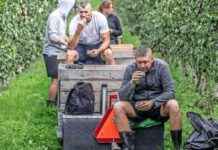What happens if the parents, when they go out to the field with their children, carrying an oval ball instead of the classic ball? What happens when a child goes with his sister for five years to play rugby with his friends? What happens when a girl doesn’t count in your house that you have fun in your training? The selections of rugby seven, male and female, are full of these stories of contagion. Parents who have been attracted to children or sisters who have been dragged to the brothers to practice their favorite sport. That is why it is not uncommon in the national rugby teams of seven, male and female, who this week played in Dubai, the World Series, has up to five pairs of brothers. This sport is becoming more popular and competitive. The player cards have doubled in 15 years and the Spanish national teams have reached a good level. A boom which also contributes to the thrust of the program LaLigaSports, which supports the Spanish Federation of Rugby (FER) and their athletes.
They were fourth in the World championship in Moscow in 2013 and fifth in united States to 2018. They, after qualifying for the Rio Games 2016, in the first olympic rugby, are being consolidated in the World Series, a competition that takes place during different weekends in several countries and ranks the best four teams to the Olympic Games. This Thursday, both teams playing that tournament in Dubai. Them, the first day and including the second. Marina Bravo (Madrid, 1989), one of the players with more experience, has been involved in the take-off of the selection. And gives with one of the keys: “There are many girls who started to play since small and now they are here. Before, which came to be international had 20 or 22 years old and had started playing rugby in college. Now the girls come with 15 years of experience. Have started small. That nourishes the team, our rugby and our game.”
Paco Hernandez escapes the mark of one of his companions. Andrea Comas
How do you get to bring rugby to a child? Those who have begun to play small point to the family environment or the school. In the rugby teams to seven in Spanish (the modality of olympic and that dispute the World Series) there are five pairs of brothers: Amaia and Lide Erbina, Manu and Tobias Sainz-Trápaga, Alejandro and Martín Alonso, Barbara, and Pol Pla, and Mary and Joan Losada. Amaia Erbina began five years ago under the influence of her father, player of the Ordizia RE, and his brother, who was with him to play games with your crew. “We come from a family,” he says. At the age of 19 he played in all Games in Rio, in which Spain won the seventh place.
“it Is very important that the children start from a young age. Starting so early has given me a big plus to lose the fear of contact, improve technical level, to know the sport more thoroughly, be more brave, try more positions and, above all, learn to have fun,” he says. His sister, Lide, was not so easy to convince her. “I lived the rugby since I was little, but I was hooked. I always thought about getting to the university and see if you tasted it. But then came along the Games and I started to see the rugby seven and I was attracted to. One summer I went to a campus, I liked the atmosphere, I learned a lot and I decided to start. I was 15 years old,” she recalls. With 17, Lide prepares to compete in the World Series. “The Games had a lot of impact. My friends, who never had seen it, told me it was a pass,” he stresses.
Pablo Feijoo requires their players in the training of the Spanish selection of rugby seven. Andrea Comas
“In the beginning we were a band”. A few days before leaving to Dubai, Paul Feijoo (San Sebastian, 1982), the coach of the men team of rugby seven uses this expression to portray the state of the rugby seven a decade ago. “Not playing anything”, admits Feijoo, who was part of the selection that was in the Games of Rio 2016, which had remained in the 10th place. “We used to meet up on a Monday and we were traveling on Friday to play the European. Even so, we won some games. But when they arrived the key moments we weren’t prepared,” he says.
The story is very different now. It is common to see the men’s team and the women compete against the best in the world. The expedition of the rugby Spanish is already years of progression. Paco Hernandez (Motril, 1988), the captain of the men’s team, also started young. At the age of 11. “We were the rare of the sports society”, he says. “It’s a cultural thing. Rugby is a sport that is known only at the university level in Spain. Now people are starting to play before, even younger than me,” he says.
His coach, Feijoo, fed on the rugby of a child (his father, Alfonso, is the president of the Spanish Federation of Rugby), but it started being pushed by “eight or nine friends” of his squad that also had done so. “The families are going to grow in rugby. Parents sometimes try to that their children do the same sport as them. For me it is a mistake”, it indicates, although it gives recipes to skip his own Redwin advice: “There are very simple tools that a kid is drawn. You can have a ball in the car. In place of one football, one rugby. Then, when you go to the beach or to the mountain, you play with the rugby instead of having the ball always.”
Navy Bravo notes the passing of Amaia Erbina. Andrea Comas
Pol Pla (Barcelona,1993) was inspired by her sisters to change the ball. This Catalan of 25 years, had always dreamed of playing football in the club is blown up, the FC Barcelona. “My older sister met the rugby in college and really liked it. We was transmitting what he lived and encouraged me to try. I was 17 years old, but I would have loved to start smaller,” she says. His adaptation was easier than I thought because she “had good teachers at home, and had seen a lot of matches”. The dream of playing for Barca he could become a reality, because the Pla today wears the barca shirt in the section of rugby of the FC Barcelona.
a Practitioner of both sports, Pla knows what is best for one and other. Rugby is left with “the social”: “I don’t like to talk about values because that is something that broadcast the people, but the feeling of brotherhood that there is around each game between all the players that we are in the field”. Football takes on professionalization: “The people who work in the clubs and in the institutions should be professional. Have a plan of development, players are treated the best possible, with the best media, physios, doctors, facilities… I Think that when you give the means to train in the best way, raises the level”.
Paco Hernánez, captain of the men’s team of rugby seven. Andrea Comas
LaLiga contributes to both. Through the program LaLigaSports, he supports the Spanish Federation of Rugby and to their athletes, as it does with other 63 federations. In addition, with 1% of its income from television rights and by making available part of its human resources, LaLiga is trying to improve the Spanish sport. Part of that money, for example, served to the Spanish Federation of Rugby take place during the last few months the concentrations in the rugby tournament to seven of the selections male and female which were held in Spain (in Elche) and Kenya, respectively. Also, the FER has been able to allocate part of these resources to the development of other projects, and to organize the international commitments of their combined, as the first event of the women’s national team of rugby seven in the World Series sailed in October in Glendale (united States). And 24 players (12 teams male and 12 female) have received financial support for their international outcomes.
in Spain, as In many other countries even with more fans, there is a rugby league to seven. The majority of the team players come from rugby teams to fifteen, the classic. The members have almost doubled the 14.807 in 2000 to the 33.482 in 2017. In the season 2015-1016, the Spanish team of Rugby XV had accumulated 36,000 spectators in their five matches of the European. Two seasons later, 58.400 people were to see the encounters, before the same opponents.
Peter Mathias, the coach of the girls rugby team to seven (left), and Pablo Feijoo, of the male. Andrea Comas
“it Is clear that rugby is growing a lot. It is more popular. The people have seen parties and we do not confuse it with american football,” said the coach of the women’s national team, the spaniard Pedro Matias, who started playing in college. “There are increasingly more children who practice this sport and each time there are more parents that use rugby as a vehicle for learning and development of their children”, he explains.
those Who practise the sport they are aware that it is a generator of values respectable. What can you offer them the rugby boys? “A good education, learn that only you’re not going anywhere, that you have to respect, that you have to sacrifice, that when you commit, you can’t let the team down. A single person does not do anything in rugby. If you have the best in the world and play solo, the other will stop. Team work is very important. And it is a thing that in life people are not accustomed to go,” says Pablo Feijoo.
Remember also the coach of the men’s team of rugby seven at the time that changed everything. It was after losing the classification to the World cup in Dubai in 2009. “We were 15 crazy, they bet all for the seven. You let things out of hand and you feel an athlete of truth. Antepones the rugby to your family, to your friends, to college, to go out at night, your girlfriend…”. It’s been a decade and the madness has grown. The illusion is spreading among young people and results in more followers and better results. No longer are a band.
Pol Pla poses after the training of the selection of rugby seven in University City. Andrea Comas








